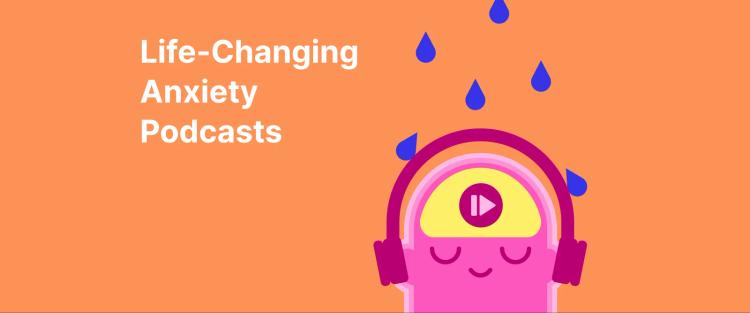Lying in bed at 2 am, staring at the ceiling, knowing you have to be up in four hours? When you can't get a good night's sleep, everything falls apart: your mood tanks, you can't focus, and your whole well-being goes downhill. You zombie through the day exhausted, then do it all over again.
Healthy sleep shouldn't be this hard, but nobody explains what actually works. Popping pills isn't fixing anything. You need strategies that address the reasons why you can't sleep in the first place.
At night, read book summaries on Headway about sleep science instead of scrolling social media. Our app features 15-minute summaries on what creates a good night's sleep, building routines that stick, and what your body actually needs for healthy sleep.
📘 Download Headway and figure out how to sleep properly starting tonight!
*Note: This advice comes from sleep authors, researchers, and field experts. However, if you're dealing with serious sleep issues, consult a specialist instead of trying to resolve them on your own.
Quick answer: 3 ways to sleep better at night naturally
Go to bed at the same time every single day. Same bedtime, same wake-up time, weekends included. When you have trouble sleeping due to the chaos of your schedule, this is what actually fixes it and helps you get a better night's sleep that lasts.
Put your phone away an hour before bed. Blue light kills your melatonin and keeps you awake. One in three American adults isn't sleeping enough already — stop making it worse by staring at screens right before you crash.
Use the 4-7-8 breathing technique when you're lying awake. Breathe in for 4 seconds, hold for 7, out for 8. Slows everything down fast. Your sleep position matters too, but this works whether you're on your back, side, or any other position you prefer.
The essential role of sleep in health
The Centers for Disease Control and Prevention reports that one in three adults in the United States doesn't get enough sleep. Yet quality sleep is not just a luxury; it's an essential part of a healthy lifestyle.
Quality sleep has a profound impact on both physical and mental well-being. It plays a crucial role in processing information received during the day, strengthening the immune system, and maintaining metabolic and emotional balance.
When you don't get enough rest, your concentration, mood, and memory suffer, negatively affecting your performance at work or school.
Phases of sleep
A good night's sleep is crucial for maintaining your health and overall well-being. It's a fantastic process that your body carefully manages. Understanding sleep can help you appreciate just how precious those restful nights are.
In 'Why We Sleep,' Matthew Walker takes readers on a fascinating journey through the complex realm of sleep. He uncovers the vital functions of light sleep, deep sleep, and REM (rapid eye movement) sleep, highlighting that maintaining a well-balanced sleep architecture is essential for our physical and mental health.
Light sleep is the first stage of sleep, during which your body and mind become relaxed, and you may wake up easily. In this phase, your heartbeat slows, your breathing becomes calm, and your body temperature cools, setting the stage for a deeper sleep. It's a serene moment when the world fades away, and all that remains is to surrender to the peacefulness of rest.
When you drift into deep sleep, your body embarks on a vital mission of healing and rejuvenation, mending the wear and tear of the day.
In contrast, REM sleep is like a lively theater stage where your dreams unfold, and your mind engages in a creative dance of learning and memory consolidation.
It's fascinating how all stages play such crucial roles in keeping the body refreshed and mentally sharp, working together like clockwork.

Body clock and circadian rhythm
Have you ever wondered why you feel more awake at certain times of the day? That's all thanks to your circadian rhythm, a fantastic internal clock that influences your sleep and active periods. This natural rhythm responds strongly to external factors, especially the balance of natural light and darkness around you.
The author of 'Why We Sleep' sheds light on the dangers of disrupting your natural sleep-wake cycles. When you stay up late, go to bed at odd hours, or spend too much time glued to a screen, you're not just losing sleep — you're risking your health and shortening your lifespan:
"The shorter your sleep, the shorter your life. The leading causes of disease and death in developed nations — diseases that are crippling health-care systems, such as heart disease, obesity, dementia, diabetes, and cancer — all have recognized causal links to a lack of sleep."
Understanding your body's internal clock can significantly impact how you feel and move throughout your day. Embracing good sleep habits not only refreshes your mind but also boosts your overall performance, defying the challenge of modernity and helping tailor your lifestyle to meet your body's natural needs:
"Humans are not sleeping the way nature intended. The number of sleep bouts, the duration of sleep, and when sleep occurs has all been comprehensively distorted by modernity."
Making quality sleep a priority can fill you with energy and vibrancy. When you consistently practice a restful night, you pave the way to a happier, healthier version of yourself.
Sleep disorders

A good sleep routine keeps your immune system strong. In 'Mindfulness,' Mark Williams and Danny Penman show how sleep disorders can affect your daily life, triggering a cascade of health issues that become harder to manage as you age:
"Depression may be exacting a staggering toll, but its cousin — chronic anxiety — is becoming disturbingly common too, with average levels of anxiety in children and young people now at a point that would have been judged to be "clinical" in the 1950s. It's not a great stretch of the imagination to assume that in a few decades unhappiness, depression, and anxiety will have become the normal human condition, rather than happiness and contentment."
Think about conditions like sleep apnea or restless leg syndrome — each one can wreak havoc on your sleep routines and, by extension, your physical and mental health. Sleep apnea, for example, causes unexplained breathing pauses during sleep, leaving you with fragmented rest, relentless daytime fatigue, and a higher risk of cardiovascular problems.
But there's hope! Consulting with a sleep specialist can provide a breakthrough. These trained professionals can diagnose sleep disorders and create personalized treatment plans tailored to your needs.
Sometimes, overcoming insomnia or frequent nighttime awakenings takes more than good habits and a cozy bedroom. Your specialist might suggest CBT-I (Cognitive-Behavioral Therapy for Insomnia) — a proven method to improve sleep quality.
The National Institutes of Health (NIH) is a great place to start for additional resources and insights on improving sleep. They offer a wealth of information on sleep disorders, including practical advice for enhancing sleep and various treatment options.
📘 Also, you can try Headway, as our app features summaries on how to get a better sleep from the experts!
How to sleep better at night naturally: Start with your sleep routine analysis!
A disrupted sleep pattern can lead to various unsettling symptoms that can significantly impact daily life.
Insomnia
Do you spend nights tossing and turning, unable to fall or stay asleep? This frustrating experience often starts when your body's melatonin production (your sleep hormone) decreases, leaving you restless and drained.
Daytime sleepiness
Picture this: you drag yourself out of bed, but by mid-morning, you're fighting to keep your eyes open. Daytime drowsiness isn't just annoying; it hijacks your focus, productivity, and overall well-being, making simple tasks seem impossible.

Appetite changes
Sleep disruption can also affect your appetite. Some find themselves craving snacks at all hours, while others may suddenly lose interest in food altogether, as if their appetite just vanishes into thin air. It's surprising how closely sleeping habits link to eating patterns.
Emotional changes
Whether you're juggling work or navigating school, poor sleep can significantly impact your mood. Irritability, anxiety, and even feelings of depression can creep in as your biological rhythms get disrupted, throwing off the neurotransmitters that regulate your emotions.
Understanding these symptoms is the first step to reclaiming your sleep and overall health. One of the best places to start is by referring to evidence-based strategies offered by experts like Chris Winter, Mark Williams, and Danny Penman.
📘 Get Headway and learn the best advice on sleeping habits from renowned experts!
Healthy habits: Begin improving your sleep with proven strategies
Establishing a consistent sleep routine that incorporates natural remedies will help you navigate each cold or warm season with renewed energy and sharper focus. In 'The Sleep Solution,' Chris Winter encourages you to be gentle with yourself, seeing rest not as laziness but as a basic need:
"It's important to remember that resting even without sleeping is good for you too. You're not wasting your time if you are lying in bed and not sleeping."
Transforming your sleep habits can pave the way to a healthier, more invigorated you. Here are some tried-and-true sleep tips to help you achieve those restful nights:
1. Set a sleep schedule: Your body thrives on routine. Make it a habit to go to bed and wake up at the same time every day — yes, even on weekends! This rhythm helps tune your internal clock and enhances sleep quality.

2. Create your sleep sanctuary: Turn your bedroom into a cozy retreat. Keep it dark, quiet, and fresh to maintain a tranquil atmosphere that encourages sleep. Invest in a good mattress and pillows — perhaps even earplugs to invite relaxation; you deserve to sleep like royalty!
"Sleep is not the absence of wakefulness. In other words, sleep is not a light switch in your brain that is either on or off. Your body is doing amazing things at night while you sleep."
3. Limit screen time with style: Embrace the evening calm by stepping away from screen light exposure at least an hour before you hit the hay. The blue light emitted by electronic devices, such as smartphones, can interfere with melatonin production and disrupt sleep.
So, why not swap your phone for gentle music, audio summaries on the Headway app, or white noise? You can even grab some stylish blue-light glasses to filter out harmful light if you need to use devices. Take this time to unwind and reconnect with yourself, letting the calm wash over you as you prepare for a restful night's sleep.
4. Manage stress: Unwind your mind through soothing practices like deep breathing exercises. Make it your bedtime routine to unwind and create the perfect atmosphere for a restful, restorative night's sleep.
"For many people who struggle with their sleep, you can almost think of their nightly angst as a mini-PTSD episode… Don't make your sleep disturbances a defining characteristic in your life. The hour or two it takes you to fall asleep is not that big of a deal. Believe this. Free yourself."
5. Watch what you eat and when: Be kind to your stomach before bedtime. Skip heavy meals and alcohol close to bedtime. Looking after your digestion can dramatically enhance the quality of your rest.
6. Stay active, but smart: Regular exercise is fantastic for sleep, but schedule intense workouts or physical activity earlier in the day. This way, your body temperature, blood pressure, and overall condition will be primed for relaxation as bedtime approaches.
7. Mind your caffeine: Enjoy your coffee — but be mindful of when you sip it! Keep caffeine consumption to the morning and early afternoon to avoid being restless at night with spiked sugar levels. As Matthew Walker, Steve West reminds readers in 'Why We Sleep,'
"Inadequate sleep — even moderate reductions for just one week — disrupts blood sugar levels so profoundly that you would be classified as pre-diabetic."
Weaving these tips into your daily routine will increase the likelihood that you'll wake up each morning feeling refreshed, energized, and ready to tackle the day. Minor adjustments can have a profound impact on your overall well-being and productivity. Yet, to make it last, you would need to take it to the next level.
How to make quality of sleep last: Mindful consistency (1-4)
A well-organized sleep schedule can enhance both your academic performance and work productivity. Not only does it enhance your physical and mental well-being, but it also cultivates a sense of overall well-being that radiates throughout your family.
Making these routines stick can unlock a happier, more productive life for everyone! Consider devoting yourself to continuing with more profound steps:
1) Mindfulness and meditation

Mindfulness is about being present and embracing each moment as it unfolds. In 'Mindfulness,' Williams and Penman picture it as an act of self-compassion:
"The quality of mindfulness is not a neutral or blank presence. True mindfulness is imbued with warmth, compassion, and interest. In the light of this engaged attention, we discover it is impossible to hate or fear anything or anyone we truly understand. The nature of mindfulness is engagement: where there is interest, a natural, unforced attention follows."
1. Raisin meditation: Take a moment to examine a raisin — its color, texture, and shape. Inhale its sweet aroma, then take a bite and savor the bursts of flavor. Chew slowly, fully experiencing the sensations as the raisin dissolves. This isn't just a snack; it's a mindful journey that takes your mind on a stress-relief walk to boost your mental health:
"Scientific studies have shown that mindfulness not only prevents depression, but that it also positively affects the brain patterns underlying day-to-day anxiety, stress, depression, and irritability so that when they arise, they dissolve away again more easily. "
2. Mindful walking: Step outside and feel the ground beneath your feet. Focus on each step and match your breath to your pace. Open your senses to the views, sounds, and scents around you. If your mind wanders, gently return to the present moment with every step.
Practice these exercises to enhance awareness and find calm in life's chaos.
2) Relaxation techniques: 4-7-8 breathing and progressive muscle relaxation
Unlock a new level of relaxation with the 4-7-8 breathing technique! It's simple yet powerful: inhale deeply through your nose for 4 seconds, hold that breath for a comforting 7 seconds, then exhale slowly through your mouth for a full 8 seconds. This rhythmic breathing calms your senses and comforts your body.

In turn, Progressive Muscle Relaxation (PMR) can reduce stress and anxiety. Start by relaxing one muscle group at a time. Take a comfortable position and focus on your toes. Tense each muscle group, hold for a few seconds, then take a deep breath and release the tension, feeling relaxation take over. Gradually move up through your body to your face and head.
These practices enhance body awareness and serve as a valuable tool for handling stress and fixing sleep problems. Give it a try — everyone deserves moments of calm!
3) Changes to diet and counseling
The secret to a good night's sleep might be simpler than you think — and it starts with what's on your plate. Did you know that a well-balanced diet and dietary supplements can work wonders for your sleep patterns? Foods rich in the amino acid tryptophan, like chicken, dairy, and nuts, provide serotonin and melatonin, your key sleep hormones.
Chamomile tea is known for its calming quality due to a natural compound called apigenin. This compound has a soothing effect on the brain, helping you relax and lower feelings of anxiety. Drinking a cup of chamomile tea before bed can help you fall asleep more easily and have an undisturbed night.
If sleep problems persist, consult a health-care provider about treatment options tailored to your needs. Proper guidance can help you safely achieve your wellness goals, whether it involves prescription medications or over-the-counter melatonin supplements. Taking melatonin can help those with delayed sleep phase disorder or jet lag.
Transform your nights with these simple adjustments, and remember that sweet dreams are just a few changes away.
4) Personalize your sleep strategy
Your sleep needs are as unique as your fingerprint. What works for one person might not work for you. That's why it's crucial to tune into your body's signals. To start, consider sleep-tracking software to scan and understand your sleeping and dreaming patterns.
Another effective strategy is keeping a sleep journal. Tracking your sleep habits can reveal how factors such as diet, exercise, and stress affect your rest.

Remember, one size doesn't fit all when it comes to sleep.
Your path to better sleep starts here – Try Headway!
Getting better sleep is about staying consistent — stick to your sleep schedule, establish a bedtime routine, manage your stress, and try natural sleep aids like breathing exercises or chamomile tea. Do these regularly, and you'll sleep better.
Headway offers book summaries on sleep science, mental health, and habit-building from people who actually know what they're talking about. Learn what creates better sleep in 15-minute reads. There are summaries on self-care stuff that help both your mental health and your sleep at the same time!
📘 Download Headway and fix your sleep tonight with what actually works!
FAQs about how to sleep better at night naturally
How can I naturally improve my sleep quality at night?
Go to bed at the same time every night, make your room dark and cool, and stop using your phone an hour before bed. Blue light kills your melatonin production. Drink chamomile tea or do some breathing exercises if you're wound up. No caffeine after lunch. Exercise helps, but not right before bed. The biggest thing is just being consistent — your body needs predictability.
How can I get 100% sleep?
That's not a thing, and trying to achieve perfect sleep every night can actually make insomnia worse. Some nights are bad, and others are great. Just stick to decent habits: same bedtime, reasonable routine, and don't stress about every little thing. Resting with your eyes closed still helps even if you're not totally asleep. Ignore those sleep trackers guilt-tripping you about your sleep score. Good enough works!
Why does Gen Z sleep late?
Screens. They're on their phones or gaming until 2 am because everything now happens online. Social media's built to be addictive, so their sleep schedules are completely messed up. School starts early, but all their friends are active late at night. There's also way more anxiety floating around than before, which keeps people up. Their whole sleep cycle is backwards at this point.
What is the best position for sleep?
Side sleeping is usually best, especially on the left side, as it helps with digestion and breathing. Back sleeping's okay if you don't snore, but it can exacerbate sleep apnea if you have it. Sleeping on your stomach can cause neck strain over time. Honestly, just try different ways and pick the one that doesn't cause you soreness. Your body figures it out.
How much sleep do you need by age?
Babies sleep for 15 hours, little kids need 11-14 hours, and school-age kids need around 9-12 hours of sleep. Teens need 8-10 hours of sleep, even though none of them get it. Adults need 7-9, and that's pretty much it, until you get older, then maybe 7-8. Most people sleep significantly less than they should and can't figure out why they feel like they're running on empty all day.









